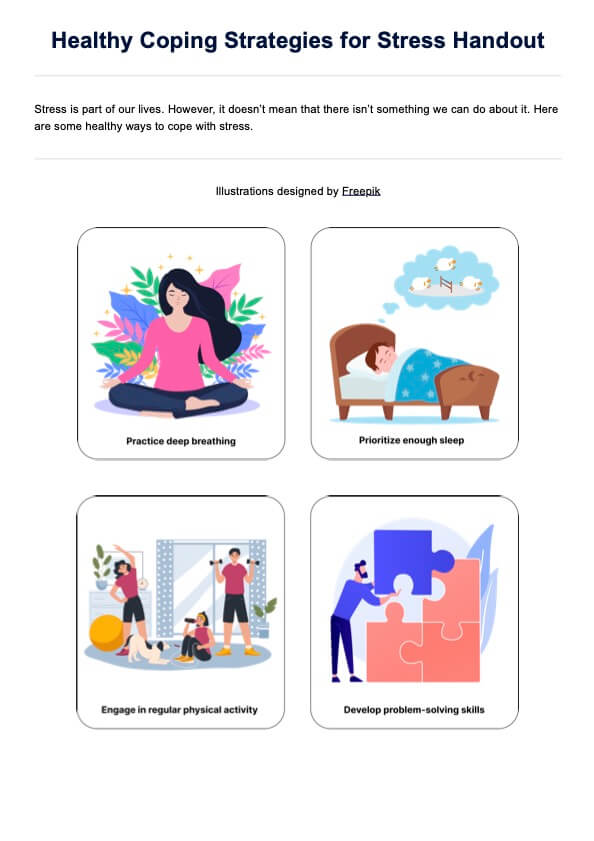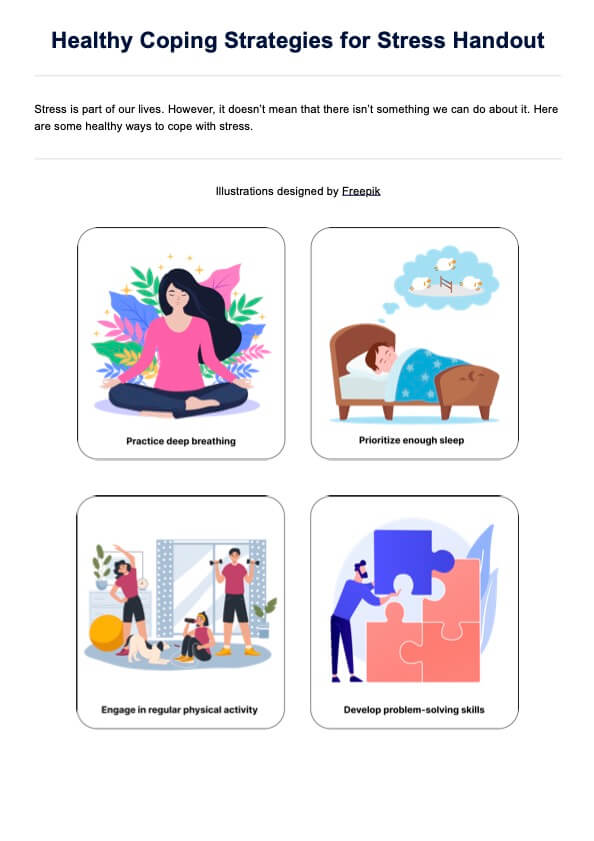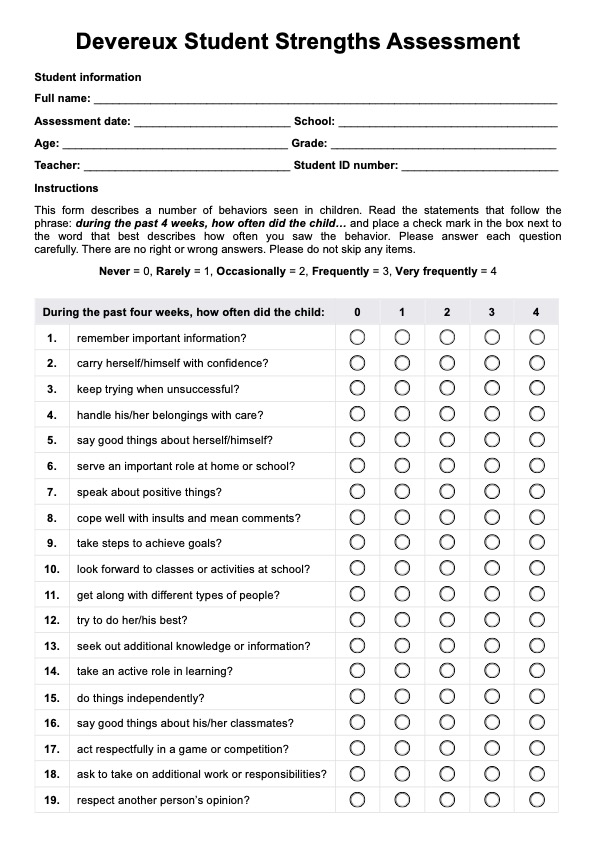Healthy Coping Strategies for Stress Handout
Explore these healthy coping strategies to help clients manage stress and stressful situations. Get this handout for free to improve their mental health.


What is chronic stress?
Stress is part of life. A healthy amount can help motivate and energize us, but chronic stress is different. Chronic stress occurs when stress continues for a long time and can worsen existing health issues. A persistent feeling of pressure and being overwhelmed is a major sign of chronic stress.
Prolonged work pressure, financial difficulties, and ongoing personal conflicts can cause chronic stress. These stressors can lead to significant mental and physical health issues and stress-related disorders if not managed effectively. Individuals experiencing chronic stress should seek mental health interventions to address their concerns and improve their overall well-being.
Healthy Coping Strategies for Stress Handout Template
Healthy Coping Strategies for Stress Handout Example
How to use our handout?
Our Healthy Coping Strategies for Stress Handout aims to help clients identify and develop certain coping strategies to manage stress and negative emotions. Follow these simple steps to guide your clients in using the worksheet effectively.
Step 1: Download the template
Start by downloading the handout template from our website. Depending on their preference, ensure you have printed enough copies for your clients or provide them with digital copies.
Step 2: Introduce coping skills
During your session, explain the purpose of the handout and how it can help your client develop practical coping skills. Discuss the strategies listed and how they can be applied in real-life situations.
Step 3: Guide them as they find ways to manage stress
Some of these coping skills might be challenging for them. As a start, work through the handout together, allowing your clients to identify which strategies resonate with them. Encourage them to practice these skills regularly to manage stress and negative emotions.
10 Healthy Coping Strategies for Stress
People have different coping styles, and clients will probably disclose how they handle life's stressors during your sessions. Some may have turned to alcohol, substance use, isolation, or overeating. This discussion is an excellent starting point to help them realize that these are unhealthy ways of coping. You can then introduce them to these 10 healthy ways for stress management.
1. Practice deep breathing
Deep breathing can calm someone's mind and reduce stress. Encourage clients to focus on breathing, which helps them manage stress and brings their bodies back to a state of relaxation.
2. Prioritize enough sleep
We can't stress enough how important sleep is to mental health. Quality sleep enables one to cope better with life's challenges. Highlight the importance of getting enough sleep each night to maintain emotional equilibrium and manage stress effectively.
3. Engage in regular physical activity
Exercise is a proven method for managing stress and improving mental and physical health. Suggest incorporating regular physical activity into their routines to release tension and boost their mood.
4. Develop problem-solving skills
One of the reasons why people are stressed is because they are overwhelmed by a particular problem. This coping strategy can significantly affect how they tackle stressful situations head-on.
5. Build social support networks
There is power in making connections. Instead of isolating themselves, encourage clients to find a support group or network. For those who may find it challenging, especially introverts, remind them that they don't need to join a large group. A small, meaningful circle where they share interests and trust can be equally valuable.
6. Practice relaxation exercises
When life seems to be tough, sometimes all one needs to do is pause and take time to relax. Introduce relaxation exercises, such as yoga or meditation, into their daily routines. These activities help to reduce stress levels and promote a sense of calm.
7. Engage in leisure activities
Like a device, we also run out of battery and need a recharge to function well. Recommend that they spend time on hobbies and activities they enjoy. Leisure activities can provide a healthy distraction from stress and help them recharge.
8. Maintain a healthy diet
Stress can lead to overeating. However, a poor diet may also be the cause of stress. When one doesn't receive proper nutrition, it can manifest in their daily endeavors. Remind your clients to be mindful of eating behaviors and maintain a well-balanced diet to nourish their bodies and minds.
9. Practice positive thinking
Help your clients challenge negative thoughts and gradually replace them with positive ones. A positive mindset can be an effective tool for managing stress and improving overall well-being. For clients who struggle with this coping skill, particularly those with a history of anxiety, emphasize that change takes time. Encourage a gradual shift in thinking, allowing them to transform their thoughts comfortably. Remind them that this process doesn't happen overnight, which can help them feel more at ease and less pressured.
10. Focus on proactive coping
Proactive coping involves building resources to achieve challenging goals and facilitate personal growth. Proactive individuals are motivated, committed to high standards, and take constructive action to meet future demands and opportunities (American Psychological Association, 2018; Ersen & Bilgiç, 2018). Advise clients to pursue new challenges, create opportunities, and promote progress toward goals.
Benefits of using this handout
Handouts are practical tools that can serve as a reference for your clients without having to memorize information. Here are some more benefits of using our handout:
It supports personal growth.
The handout aids clients in setting and working toward personal goals, fostering their growth and development through targeted strategies.
It promotes self-awareness.
Clients can reflect on their stressors and coping mechanisms, enhancing their self-awareness and understanding of what works best.
It is ready-made and digital.
The handout is a ready-made digital resource that can be easily accessed and used, saving time and ensuring clients have immediate access to valuable coping strategies.
References
American Psychological Association. (2018, April 19). Proactive coping. https://dictionary.apa.org/proactive-coping
Ersen, Ö., & Bilgiç, R. (2018). The effect of proactive and preventive coping styles on personal and organizational outcomes: Be proactive if you want good outcomes. Cogent Psychology, 5(1). https://doi.org/10.1080/23311908.2018.1492865
Commonly asked questions
Common strategies include exercising, talking to friends, and practicing relaxation techniques like deep breathing.
No, because people have individual differences, they cope with stress in different ways based on their personal experiences and preferences.
Seek professional help if stress becomes overwhelming, affects daily life, or leads to significant mental or physical health issues.




















-template.jpg)



















































































